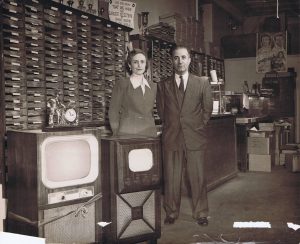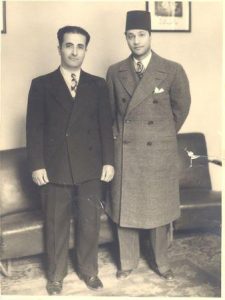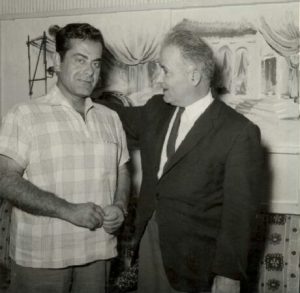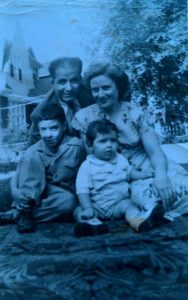The Rashid Legacy: How Music Preserved Arab Heritage in America

BY: Nisreen Eadeh/Staff Writer
Most of Stanley Rashid’s life has been surrounded by vinyl records, audiotapes, and CDs carrying the legendary voices of Farid Al-Atrash, Fairouz, and Wadih Safi. His father, Albert Rashid, founded Rashid Sales Company in 1934 – the first exclusively Arab music company in America.
Rashid Sales Company started in Detroit during the Great Depression when every American suffered from the country’s economic loss. One way to remain happy during these trying times was to lean on culture and family. Albert’s business began when he purchased the film The White Rose, starring the legendary Mohammed Abdel Wahhab, from a Syrian immigrant. From there, Albert traveled from city to city to show screenings of the film in churches and theaters to fellow Arab immigrants looking for a reminder of home.

“The White Rose was one of the first Arab musicals, and everyone wanted the music from the film,” said Stanley. “[My father] wrote to Baidophone Record Company and bought the records from them.” These were the first tracks Rashid Sales sold; the people Albert met touring with The White Rose and other films became his first customers.
A clip from “The White Rose” featuring Mohammed Abdel Wahhab playing the oud.
Albert created a system for distributing music until the company’s last days. Stanley recalled his father’s system of creating catalogs and mailing them out to Arab Americans who ordered music by phone or mail. This distribution continued until the late 1990s when Stanley and his brother Ray printed 90-page catalogs full of Arab music CDs from Sabah to Amr Diab.
Rashid Sales became the cultural conduit between Arab Americans and their homeland. “The record companies would notify us, send us samples, and we would approve them,” recalled Stanley. The family was constantly in touch with producers and distributors in Egypt, where timeless artists like Oum Kalthoum got her start in the mid-1930s. These artists reached international fame and were brought to America by Albert through records and films.

However, the business came to a halt in 1940 at the start of World War II when Albert had to work at the Ford Defense Plant in Dearborn, Michigan, for three years. “During World War II, we could not get any records because they were shipped by ocean. All the records came from Egypt through Germany or Czechoslovakia, but the U.S. placed an embargo on all goods from those countries.”
“So my dad had to find artists in this country to record… and we found them,” said Stanley.
Albert picked up his family and moved them to Manhattan, where he opened his first storefront in 1943. In New York, Rashid Sales began recording the voices of Arab Americans on 78-RPM records.

Five years later, Rashid Sales had a second storefront in Brooklyn, which stayed open until 1995, making the New York borough the hub for Arab music in America. Near the end of the war, Albert had his first major hit from a Lebanese immigrant everyone called “Little Sammy.” The song, Khaleek Aazeb (Stay Single), was admired by the early Arab Americans and the post-World War II wave of immigrants coming from Syria, Lebanon, and Iraq.
Soon after the war ended, Egypt distributed music again, but this time through Greece and England. “Egypt was always strong,” recalled Stanley. “When the Egyptian Army staged a coup and overthrew the monarchy, most of the larger commercial enterprises were nationalized.” Since many of these businesses were owned and operated by non-Egyptians who had immigrated to the country decades before, they were forced to leave. Some migrated to the U.S. and Canada, where they kept in touch with Rashid Sales.
The music company relied on an international economy to meet the high demands for culture and entertainment from the Arab American community. The Rashid family welcomed artists and producers from the Arab world to America, boosting the company into international distribution stores in the 1980s.
“We take pride in the fact that we were able to keep the culture, love for the Arabic language, music, and eventually books available to those immigrants who came here from various Arab countries,” said Stanley. “Everyone wanted to continue the connection with his or her homeland,” he added.
Arab America President Warren David remembers visiting Rashid Sales in the 1970s, 80s, and 90s. “Rashid Sales was an anchor to my culture because I didn’t grow up in the Arab world, so the only way I could identify as an Arab was through music and food,” said Mr. David.
For many third and fourth-generation Arab Americans like Mr. David, buying records at Rashid Sales helped them create an Arab American identity. “The more connected I became to my roots, the more passion and appreciation I had for my community. Rashid’s music helped many of us to preserve our culture.”
The Rashid family is now retired, but their influence has remained, whether Arab Americans know them or not. Unfortunately, the introduction of digital music turned records into dust collectors or ironic tchotchkes for Millennials. However, the importance of preserving heritage has yet to go out of style.

Stanley encourages Arab Americans today to “get involved in the many websites that try to do the same thing that the brick and mortar clubs did for older generations.”
There needs to be a place where “they can interface with and get involved culturally and politically because we not only need to maintain our heritage, but we also need to maintain our civil rights in this country,” Stanley continued.
Arab Americans must remember their ancestral lands as more than just places where violence forced people to flee. If Arab Americans don’t preserve their heritage, no one will.
The younger generations deserve to look at where they came from in a pleasant light that elicits excitement, not fear or hate. Rashid Sales brought together assorted Arab immigrants who were building new lives for themselves in America through the stirring sounds of talented singers. In their mission to bring music to the homes of fellow Arabs, the Rashid family helped build an Arab American society.
Visit our blog here!


